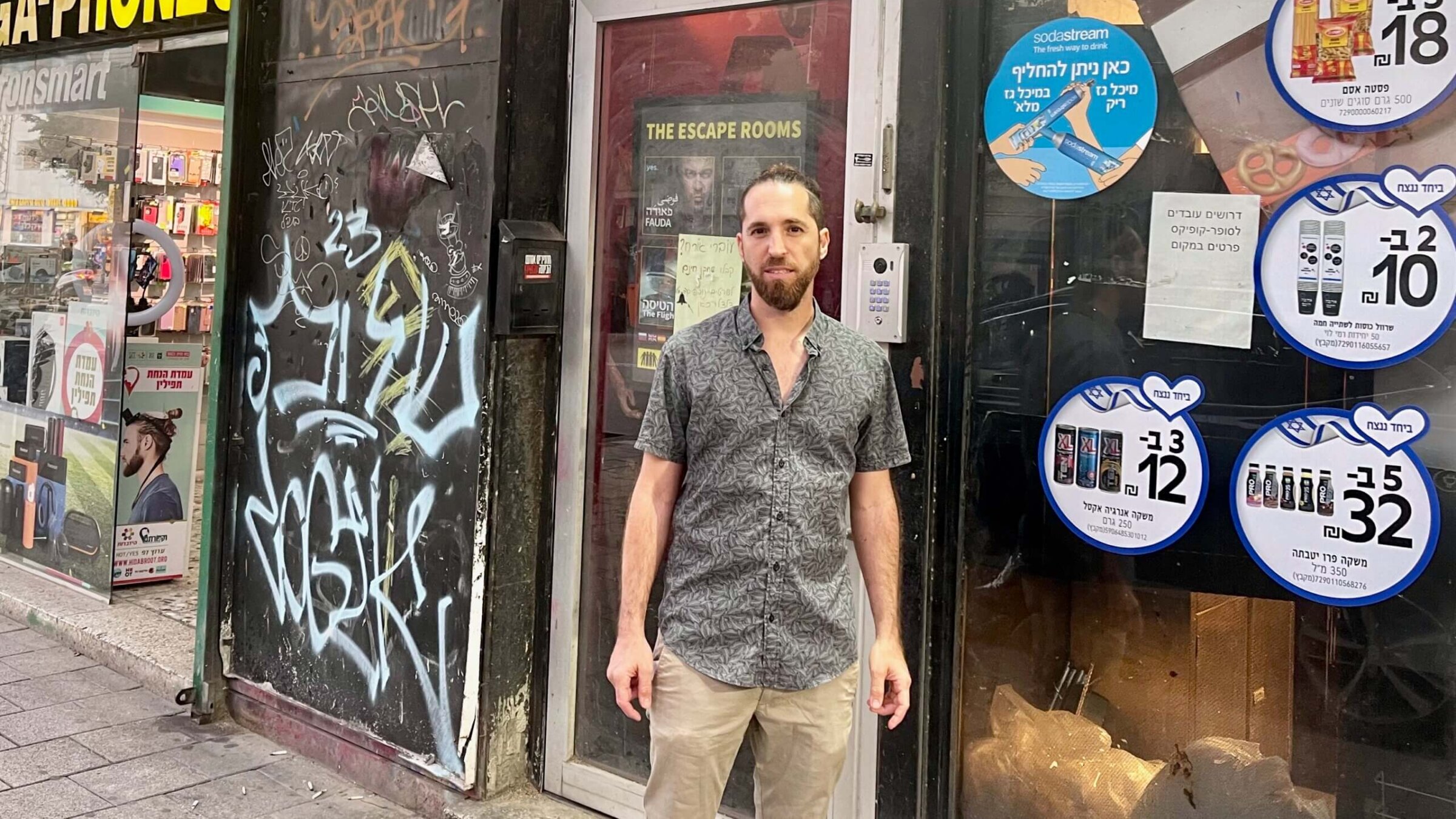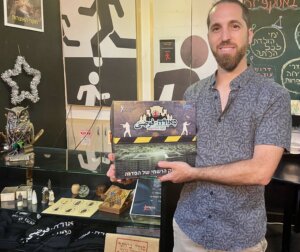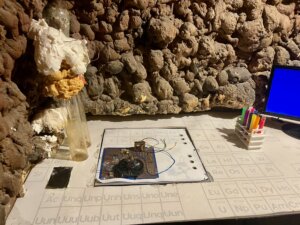Escaping Gaza, for fun: Israelis take to ‘escape rooms’ that mimic war
Operator of ‘Fauda’-based Gaza role-play game says customers want to ‘kick some Arabs’ ass’

Arik Turkenich outside his Tel Aviv escape room business. He lets all players win because, he said, Israelis “can’t afford losing.” Photo by Susan Greene
TEL AVIV — You’re an Israeli agent blindfolded, hands on the shoulders of a comrade in front of you — who is also blindfolded, hands on the shoulders of the one in front of them.
You shuffle together through a maze of doors until you’re allowed to remove the kaffiyehs from your eyes. You find yourselves packed into a dark apartment in Gaza City, a TV blaring news in Arabic.
The Al Jazeera broadcast cuts to a video message from your commander, speaking in Hebrew: You have two minutes to disguise yourselves as Palestinians, he says, then 58 to make your way to Al-Shifa Hospital and through a tunnel beneath it to neutralize a chemical bomb. If you’re caught, Israel will deny any connection to you. And if you fail, a terrorist will plant the bomb in Israel.
“God bless,” the commander says solemnly. “Come on! Go! Go!”
Welcome to “Fauda: Explosive Lab,” an escape room on Tel Aviv’s Allenby Street, 45 miles and seemingly a world away from the actual tunnel Israeli forces discovered in November around the real Al-Shifa Hospital.

Arik Turkenich, a businessman, built this live-action role-playing experience back in 2016, shortly after the debut of Fauda, the hit Netflix show. He consulted with the show’s creators on the design, and arranged for its star, Lior Raz, to play the commander.
Business boomed as Fauda gained fans in Israel and across the globe. At about $33 a head, “Fauda: Explosive Lab” was popular for corporate team-building, bachelor parties and tourists alike.
Perhaps unsurprisingly, business flatlined after Oct. 7, as tourism dried up and Israelis were traumatized by Hamas having killed 1,200 people and abducted 250 to Gaza spaces similar to those in Turkenich’s escape room.
But a trickle of customers began to filter back in January, and Turkenich said most are choosing the Gaza scenario rather than his other rooms — one based on a J.R.R. Tolkien-style quest and the other on a plane crash in a South American rainforest.
One group that came were evacuees from a community near the Lebanese border. There was a unit of Israeli soldiers who arrived in uniform with their commander. And, to Turkenich’s surprise, the wife of a reservist who recently returned from Gaza booked the Fauda room for their first night out together.
“It’s funny,” he said, in a funny-not-funny sort of way. “I thought at the beginning I should close it. I thought who the hell would want to play ‘Fauda’ now? But Israelis, you know, they’re unpredictable.”
Escape rooms started in Japan in 2007, and there are now about 150,000 worldwide. Gai Bosco, an Israeli who has designed about 250 of them, said that a decade ago, Israel had 400 escape rooms, or one for every 20,000 people — the highest per capita ratio in the world. Now there are 186, he said, keeping the country in the top 10.
“They’re often targeted to families and we’re a family-oriented country,” Bosco said by way of explanation. “And, of course, there’s a high need here for escapism.”
Typically, these role-play rooms challenge groups of up to 20 to “escape” some scenario by solving a series of riddles and puzzles, using props, costumes, lights and effects around a storyline involving, say, aliens, monsters, gangsters or serial killers.

Turkenich is not alone among Israeli operators in also offering closer-to-home scenarios. Karen Almog, who owns escape room complexes in Raanana and Petach Tikva, offers “Behind Enemy Lines,” which takes place in Iran and involves a nuclear weapon. She has been soul-searching since the Gaza war started about whether pretending to trap customers in a room under fake duress is an ethical way to eke out a living.
“Of course I want the business back,” she said, “but I want the hostages back even more and want to avoid seeming insensitive to the traumas my country is facing.”
An escape room in the northern city of Tsfat also has a uniquely Israeli offering — though it has nothing to do with the Palestinian conflict. Instead, it pokes fun at Israel’s notoriously opaque bureaucracy: Your friend is out of town, it begins, and needs your help proving to the government that he owns his apartment.
The operators said last summer was their most successful season since opening in 2018. But with Hezbollah, the Lebanese Shiite militia, launching missiles at Israel’s north, all groups canceled their bookings between Oct. 7 and the end of November. So they have been selling a series of video games about Israeli history, Judaism and Jewish scripture to make up the income.
Turkenich, too, has pivoted, by re-promoting a play-at-home version of “Fauda — Explosive Lab” he created during the 2020 pandemic lockdown. Online sales of the game rose by about half after Oct. 7.
“I think there are people sitting there feeling angry,” he said. “They’re wanting to do something to help, they’re wanting to kick some Arabs’ ass.”
“In times of war, you feel like fighting.”
He sent a few dozen games to the IDF, and got back a plaque showing off-duty soldiers playing the gamified version of the war that has, over the past four months, killed more than 28,000, according to the Gaza healthy ministry.
The unit of unformed soldiers who came to his Tel Aviv escape room in January found their way to the facsimile of Al-Shifa’s emergency room, which the IDF had raided in real life two months earlier. From the fake ER, players have to figure out how to open a trap door to a Hamas command center. They use guns stashed there to kill off a cadre of fighters shooting at them through a window. Then they wind their way through a dark, underground tunnel to dismantle the chemical bomb.

Afterwards, the escape room employees asked the IDF soldiers if they felt afraid entering the hospital.
“They said no,” Turkenich recounted, “because they were the ones who already were killing all the terrorists in the hospital and around it.”
On Thursday, IDF forces raided the Nasser Medical Complex in Khan Younis, citing intelligence reports that hostages had been held there.
“We didn’t think that in the most extreme scenario, they would use these tunnels to hide our people, our sisters and brothers who are still there,” Turkenich said. “I’m sure for many, this place is extremely sensitive and uncomfortable,” he added of his escape room. “It’s a nightmare come true.”
Escape-room experts say participants generally “win” about 30% to 40% of the time. But Turkenich always makes sure his customers complete their mission.
“Everyone in Israel thinks they’re so smart and they, you know, blame the operator if they don’t win,” he said.
“Because of our history, we have to win because we can’t afford losing.”















